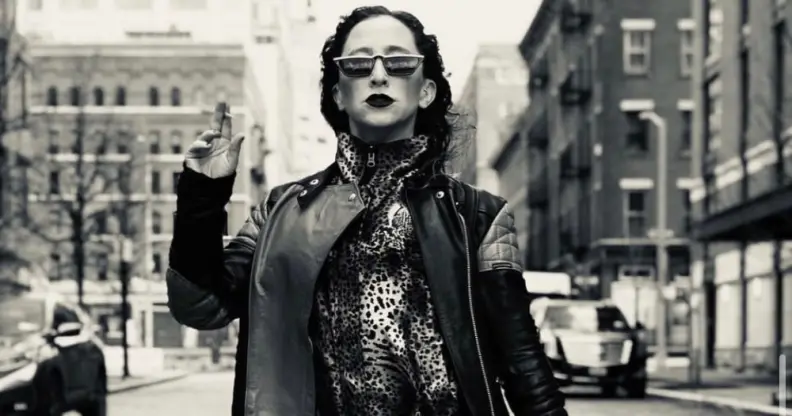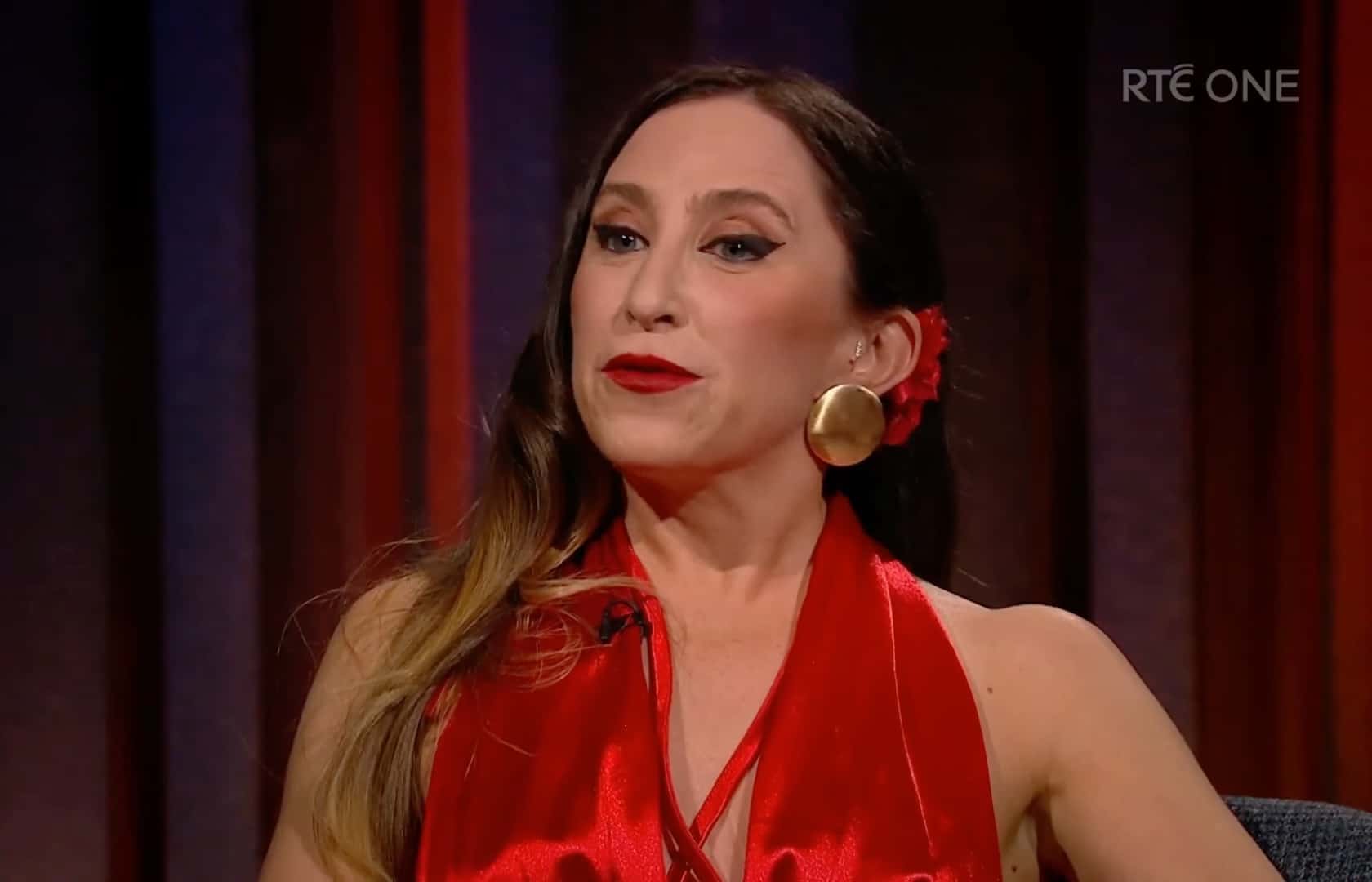Sex workers are ‘dropping like flies’ and forced into ‘risky work’ as COVID runs rampant

Kate McGrew has moved her work entirely online because of omicron. (Peter Byrne/Provided)
Lydia Caradonna says there’s “no way to work safely” as a sex worker as long as the coronavirus pandemic is ongoing.
COVID-19 has upended so many industries and it has resulted in countless people losing their jobs. Sex workers have been among the worst affected.
The Omicron wave has made the outlook even worse. Once again, sex workers have found themselves unable to meet clients safely, always working in fear that they could contract or pass on COVID-19.
High case numbers have also impacted on client numbers. Countless sex workers have found themselves struggling to make ends meet – and they no longer have savings to fall back on as they did at the start of the pandemic, Lydia says.
“Within the sex industry, most of us write off October to February as the slow season,” Lydia explains. “Lots of us will be living on savings in that time anyway because work always drops around that time of year. But the problem is, we haven’t been able to make any savings because we’re on – what is it, year three now? – of this pandemic.
“We’re having more than just a usual slow period – we’re having another wave of COVID, this huge Omicron wave. I’m in a group chat with 20 sex workers and last night we were all freaking out because no one was even getting time wasting texts, no one was getting phone calls. Last brothel shift I did, I came home with £80, which is absolutely terrible.”
Lydia says many sex workers have stopped “screening” – the process by which they assess if a client is safe – because they can no longer afford to turn anyone away.
“We’re having to take chances on the clients we can get,” she says. “Even dropping safety measures isn’t helping us make ends meet. We’re in really dire times.”
Lydia has resigned herself to the fact that she’s probably going to get COVID soon because it’s impossible to avoid it as a sex worker.
We really don’t have any option but to go and do really risky work with no way to protect ourselves, and then we get blamed for it.
“I’ve somehow – God knows how – managed to avoid it so far, but people are dropping like flies,” she says. “I’m in this awful situation where I’m going to a shift where I know I’m probably still not going to make enough for rent, and while I’m on this shift I’m risking getting seriously ill and in that time I won’t be able to work, so I still own’t be able to make rent. You’re going and doing this extremely risky thing because you have absolutely no choice but to with the way your finances are at the moment.”
The situation gives rise to feelings of guilt, Lydia says – she sometimes feels like it would be her fault if she ended up getting COVID.
“I know we shouldn’t feel guilty because the government put us in this situation where we have to go and work,” she says. “The self-employment income scheme has basically stopped. We really don’t have any option but to go and do really risky work with no way to protect ourselves, and then we get blamed for it. We get called vectors of disease, or people talk about these ‘prostitutes’ going out spreading COVID, but we’ve been given no choice but to.”
Some sex workers have stopped meeting clients – but the financial impact is severe
Kate McGrew, a sex worker who lives in Dublin, has faced similar challenges. She hasn’t worked with any clients in person since Omicron hit – she moved entirely online to avoid contracting the virus through her work.
“I have been surprised since the onset of the pandemic to discover how hot virtual work can be – the brain is a powerful sex organ – but I would prefer to meet these fellas in person,” she says. “I am very appreciative of my subscribers but creating content is not my preferred way of working.”
There’s also the fact that online work is “less lucrative” to contend with. “It takes way more time for way less money,” she says, adding that the platform she uses takes 30 per cent of her earnings.
“Like many people who are missing out on work at this time my earnings have taken a hit,” she says. “The bank account may halt but the bills never do.”
Throughout the pandemic, Kate has taken measures to protect herself from contracting COVID-19 through her work. When she is meeting clients in person, she usually asks that they are vaccinated before doing so.
“I do know many workers who ask to see the cert, and I also know many workers who don’t ask at all and just take what precautions they can: getting jabbed themselves, airing out the room, not kissing, etc,” Kate explains
“One of my favourite clients at the moment (who takes me as his sub, swoon!) has me take a rapid test at the beginning of each session, and he wears a mask the whole time. Potentially I could perceive this as awkward or insulting, but for me it only takes a small amount of reframing and prioritising in my mind to get into the practice.” She says that the set-up has “become hot” because it “feels in line with good and fun BDSM practice and accoutrement”.
OnlyFans stars have had to postpone work
The pandemic has also impacted on sex workers who operate through websites like OnlyFans. Matt Lownik, better known to his fans as TenInchLondon, started sharing content through the platform shortly before the pandemic began. COVID meant that he couldn’t make new videos during lockdowns as he couldn’t get together with potential partners. Instead, he relied on unreleased footage and material, along with solo content.
The arrival of Omicron before Christmas disrupted his plans once again.
“When Omicron really started kicking off just before Christmas and we weren’t sure about the seriousness of the variant, I rescheduled the content that I was meant to be filming,” Matt explains. “I spent Christmas with my family and friends, and didn’t want to put them at risk through filming in those couple of weeks before.”
Matt considers himself lucky that COVID hasn’t disrupted his work in the same way it has affected other sex workers. He found himself in the unique position that his income actually increased over the latest COVID wave as more people turned to the internet for sexual fulfilment. The same phenomenon occurred in previous lockdowns, he says.
“I think people have been staying home and avoiding hook-ups or cruising, so actually have been engaging more with content on Twitter and fan sites,” he says.
Matt is back to work now, but he’s still taking precautions to make sure he can continue to earn a living safely. He’s gotten his booster, and he expects scene partners to have done the same.
“Keep safe, get boosted and do regular lateral flow tests to make sure your health – and the health of the people close to you – are always the top priority over filming,” he says.


